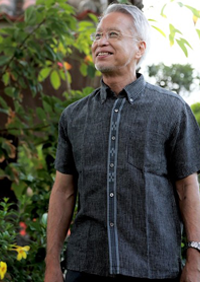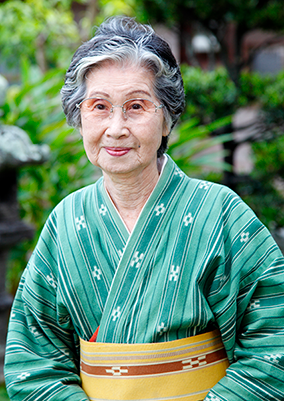Message from the CEO
Tradition, Innovation, and Sustainable Craftsmanship
Thank you for your continued support.
Just before Okinawa was returned to mainland Japan in 1971, our company, Azamiya, was founded as a textile manufacturer. The reversion has led to significant island development, but there were indications of a major influx of capital from the mainland at the time. In such a situation, the founder saw value in developing a special local industry with local labor and attempted to industrialize the traditional craft of Yaeyama Minsah-ori. Since then, we have carried our business with that goal in mind for more than 50 years, and we still give it our all today.
We value the Minsah-ori Kasuri pattern motif and produce items that can be incorporated into modern daily life like obi belts, clothing, interior decorations, and accessories with craftsmanship.
The Kasuri pattern uses a simple combination of a five-square and a four-square pattern since the words for five and four sound the same as a phrase meaning “forever for eternity.” We work to create products and crafts that fit any lifestyle.
Minsah wear has been frequently worn as local summer clothing, particularly in recent years following the Okinawa Summit in 2000. As a regional resource for cultural tourism, it is a favorite of visitors.
Since our founding, we have made it a priority to develop new products while respecting tradition, listening to our customers, and continuing to deliver products that satisfy their needs. We are extremely grateful that we have been able to grow alongside our customers up until this point. In the future, we will continue to work toward the industrialization of regional textiles as well as the promotion and growth of textile culture. We will make an effort to produce crafts and everyday items that have aesthetic value as crafts.
The famous haiku master, Matsuo Basho once said, “Seek what the ancients desired rather than the traces of the past.” I believe the ideal of ancient people was to explore and pursue new elements that suited the times. We, therefore, seek to develop items that pursue “tradition and innovation” based on preserving the traditions established and passed down by our predecessors because they have brought about innovations while valuing traditions.
I feel that it is necessary to “connect” and to “interact” more than ever now that we have finally come out from the long tunnel of the COVID-19 pandemic. I believe that human resource development through craftsmanship is an essential and most important initiative. We will work on the Sustainable Development Goals (SDGs), which are global initiatives, as well as other environmental (social) creations. We think that this will help preserve, maintain, and restore Yaeyama’s beautiful natural surroundings and different ecosystems, where Yaeyama Minsah-ori weaving was born.
Additionally, we consider it to be the greatest blessing that our Yaeyama Minsah-ori weaving will be passed down to future generations “forever for eternity.”
Kenji Ara 
Azamiya Co., Ltd.
CEO
With the spirit to protect and nurture
In the Yaeyama culture, where distinctive traditional weaving and performing arts have been passed down and are still practiced today, textiles have long been thought to “play the role of protecting the soul” in addition to the physical body. Yaeyama’s spiritual culture is reflected in the Yaeyama Minsah-ori characterized by five-and-four square Kasuri patterns arranged alternatively, a vital component of the area’s cultural heritage that must be passed down to future generations. While “protecting and nurturing” this cultural heritage, we aim to create products that can be incorporated into daily life, and hope to simultaneously create products that put value on the innate spiritual nature of creation.
Kinue Ara
Minsah Crafts Museum
Director
“Contemporary Master Craftsman”

